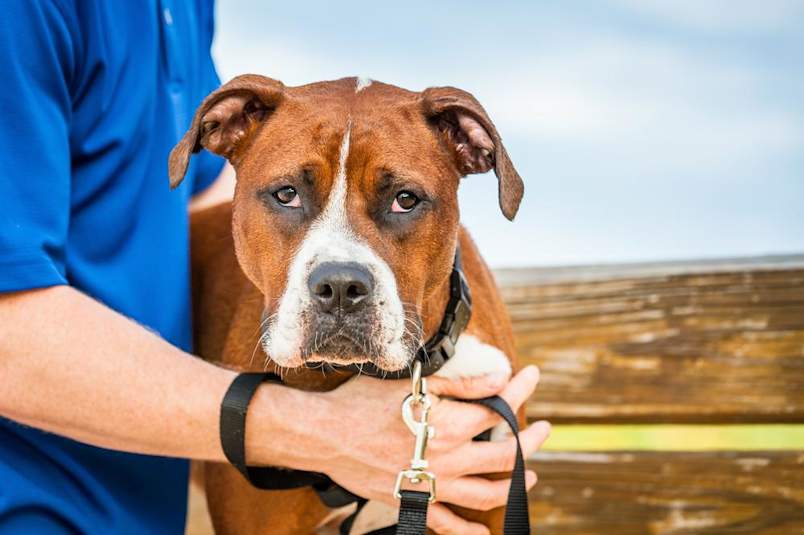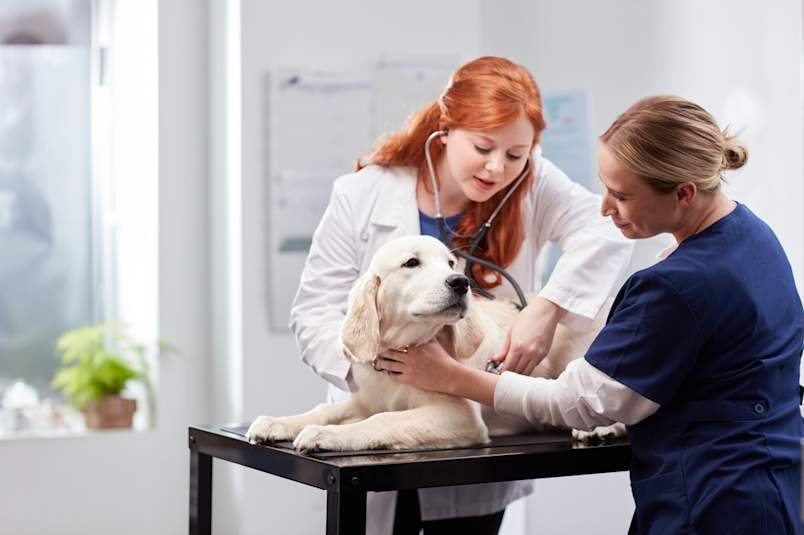
One thing all pup parents are familiar with is dog diarrhea. While it may not be the most pleasant topic to discuss, it is important to be aware of it. Unfortunately, our furry friends are relatively prone to this uncomfortable condition, and there are many factors that can trigger it.
If your dog has diarrhea, there's no need to panic right away. In some cases, the cause can be easily resolved at home, but there are instances where it can indicate a more severe problem. That's why knowing the potential causes of your pup’s diarrhea is crucial. Being prepared and knowing what to do if your dog has diarrhea can help you determine if a visit to the vet is necessary (and what your insurance coverage may cover).
My Dog Has Diarrhea: What's Causing It?
There are a lot of things that can happen to upset your pup's well-balanced system and give them a nasty case of diarrhea (loose, liquid stools). Some causes, like eating something that disagrees with them or loose stools associated with mild stress, are not usually serious. However, certain situations can be early indications of life-threatening issues, such as pancreatitis or cancer.
If you're dealing with dog diarrhea, it can likely be attributed to one of these 12 triggers:
Dietary Indiscretion: Overeating or consuming foods/items that are not good for dogs can cause dog diarrhea. This can include table scraps, garbage, spoiled food and animal carcasses.
Change in Diet: Unlike people, who tend to easily process a variety of new foods on a regular basis, it takes time for most dogs to adjust to new foods. A gradual transition is best when switching food brands to avoid an upset stomach.
Food Intolerance: Some dogs have difficulty digesting certain ingredients.
Allergies: Dogs can develop allergies to certain foods or environmental factors. Common food allergies include beef and dairy products. Signs of allergies can include gastrointestinal (GI) upset, itching and skin and ear infections.
Parasites: Puppies or dogs with weakened immune systems can be affected by intestinal parasites such as roundworms, hookworms, whipworms, coccidia, tapeworms, and/or giardia. Intestinal parasites are more common in dogs that are not on regular heartworm prevention (which usually covers other types of parasitic worms), but some types of GI worms are not controlled by such medications.
Ingestion of Poisonous Substances or Plants: Certain substances and plants can be toxic if ingested by dogs. Diarrhea and feeling a bit puny can occur with some types of toxicities, but others can be life-threatening. Toxic substances that can be especially scary for your dog include NSAID pain medications (eg, ibuprofen, naproxen), lead, sago palms, chocolate, blue-green algae, and xylitol (a sugar substitute).
Swallowing an Indigestible Foreign Object: Dogs may accidentally ingest objects that are difficult to digest or pass through their system, like toys or socks. This can lead to diarrhea, although sometimes they will not be able to produce any stools because of an intestinal blockage.
Infections with Common Viruses: Viral infections like parvovirus, distemper virus, or canine coronavirus can cause dog diarrhea.
Bacterial Infections: Bacteria such as E. coli, Salmonella, Campylobacter, or Clostridium species can lead to diarrhea and other signs of GI upset.
Illnesses: Conditions like pancreatitis, kidney failure, liver disease, colitis, hypoadrenocorticism (Addison’s disease), exocrine pancreatic insufficiency, hemorrhagic gastroenteritis (also called acute hemorrhagic diarrhea syndrome), inflammatory bowel disease or certain types of cancer can be associated with dog diarrhea.
Medications: Some medications can have GI side effects, including diarrhea. These can include certain types of antibiotics, laxatives, chemotherapeutics and steroids.
Stress or Emotional Upset: Dogs, like humans, can experience digestive disturbances due to stress or emotional factors. Stress for dogs encompasses more than worry or fear. It also includes physical changes like heavy exertion or recovery from surgery.
Understanding these triggers can help identify the potential cause of your dog's diarrhea. Remember, it's essential to consult a veterinarian if you're unsure about the cause or if your dog’s signs persist.

What Your Dog's Poop Says About Their Health
Believe it or not, your dog's poop can provide valuable insights into their overall health. We can gather important clues for diagnosing and addressing any potential issues by paying attention to its color, consistency and shape.
If your dog has diarrhea, it's crucial to observe and note these factors, along with any other relevant information on recent associated events (eg, your pup getting into the trash a couple days ago) and symptoms or clinical signs you can describe to your veterinarian. While many cases of dog diarrhea can be managed with home remedies and resolved within a few days, it's wise to reach out to your vet if it persists for an extended period or if additional signs arise that might indicate a more serious underlying problem.
The Scoop on Canine Stool Consistency
When it comes to the ideal consistency of dog poop, picture it as a compact, well-formed log that can be effortlessly scooped up using a plastic bag. According to experts, it should have a texture akin to cookie dough or Play-Doh when gently pressed.
Large volumes of poop, a pudding-like or watery consistency or the presence of mucus (which may resemble jelly) or blood are not considered normal. Objects in the stool, such as plant material, intestinal worms, or trash (eg, candy wrappers, cloth) should also be noted. If you notice any of these abnormal characteristics, it's advisable to consult your veterinarian for further evaluation.
Decoding the Palette of Dog Poop
Believe it or not, the color of your dog's stools can provide valuable insights into their digestive health. As disgusting as it may be, examining both the color and consistency of dog diarrhea can equip you with important details to share with your veterinarian.
Armed with this information, your vet can determine if an examination is needed or if you can manage the situation at home.
To help you navigate the colorful world of dog poop, here's a general guide to its hues and what they may indicate:
Chocolate Brown: A range of browns from light tan to dark brown are typical, normal colors for a dog’s stool. The hue may change a bit from one bowel movement to the next, even if your dog’s diet remains the same.
Blue, Blue-Green or Turquoise: Blue stool can sometimes indicate that your dog ate rat poison. If you see this stool discoloration, make an appointment to see your veterinarian as soon as possible. If you recently put out rat bait stations, bring the package with you to the appointment or take a picture of it- many types of rat poison products are on the market and treatment can differ depending on which kind was ingested.
Green: While not always concerning, if you spot green stools, it could suggest excessive grass consumption or a potential issue with the gallbladder. Green stool can also be normal for some dogs, depending on their diet (especially if mixed in with shades of brown).
Orange: An orange shade might indicate a biliary or liver issue, and your vet should evaluate your pet further.
Red Streaks: The presence of red streaks in the stool could indicate blood in the stool. Note that some dog foods can cause reddish-brown stool color as well. It is best to discuss your concerns with a veterinarian to be safe.
Black & Tarry: Stools that are black and have a tar-like consistency could indicate bleeding in the upper GI tract. It's crucial to seek immediate veterinary attention if this color pattern and stool consistency are noted.
Grey & Greasy: If your dog's poop appears grey and greasy, it may point to a potential problem with the pancreas or biliary system or it could indicate that your dog ate a very fatty, oily meal. Either way, consider discussing this with your veterinarian, as fatty meals can lead to dangerous digestive issues such as pancreatitis.
White: The presence of white spots (eg, resembling grains of rice) or white streaks (eg, resembling spaghetti) can indicate intestinal worms. Take a sample to your veterinarian’s office to diagnose the type of worms and get an appropriate deworming medication. White, chalky stool can indicate a liver issue and should be addressed by your veterinarian quickly.
Remember, this guide is a helpful reference, but it doesn’t cover all of the possible causes of stool discoloration. Further, dyes in people food and table scraps or even non-food items (eg, crayons) can discolor a dog’s stool without necessarily causing an issue. Because there may be no way of knowing initially whether the discoloration is harmless or problematic, it's always best to consult your veterinarian for a comprehensive evaluation and accurate diagnosis.
How to Treat Diarrhea in Dogs
What helps dog diarrhea? Thankfully, a significant number of cases are mild, which means you might be able to assist your furry friend from the comfort of your home with guidance from your vet. Following a simple regimen of basic treatments may help your pup find relief. These treatments may include:
Over-the-Counter Dog Diarrhea Medication
Having over-the-counter dog diarrhea treatments readily available is a smart move for every dog owner. You can conveniently order them online and have them delivered swiftly, ensuring you're well-prepared for those occasional episodes of loose stools or diarrhea that can happen to any dog. Consult your veterinarian about over-the-counter medications before giving them, even if they state that they are made for dogs. Some companies falsely advertise certain types of treatments, which may be ineffective, or worse, dangerous to a sick pup.
Fasting
A common initial step when faced with dog diarrhea is to withhold food for 12 to 24 hours while providing small and frequent amounts of water. This approach can help address the underlying cause of the upset and allow the GI tract to settle. It's often the first line of defense if your dog has diarrhea.
It's crucial to consider your dog's overall health before deciding on a fasting period. Puppies and elderly dogs, for instance, require essential nutrients and may not tolerate fasting very well. Additionally, small dogs may lack physical reserves compared to larger breeds, making fasting less appropriate for them. Regardless, do not withhold food from any dog for more than 24 hours without veterinary consultation.
Remember, diarrhea can lead to dehydration, so ensuring your dog has constant access to water is important. In some instances, under the guidance of a veterinarian, you may also offer unflavored Pedialyte to help maintain electrolyte balance.
Home Remedies for Dogs with Diarrhea
After fasting, there are a number of treatments you can provide at home to help with dog diarrhea. Gradually reintroducing simple, easily digestible foods into their diet can help normalize stool consistency. Here are some tried and true home remedies that can be helpful:
Plain White Rice: Cooked, unseasoned white rice acts as a binding agent and can aid in resolving diarrhea.
Pumpkin: You can use 100% pumpkin puree from the grocery store, pet-safe pumpkin powder, or canned pumpkin specifically made for dogs. It's interesting to note that pumpkin can be effective for both mild diarrhea and mild constipation. Just ensure that if you purchase canned pumpkin, it is 100% pumpkin and not "pumpkin pie filling," which contains additional ingredients like sugar.
Plain Yogurt: If your dog can tolerate milk and milk products, plain yogurt with active cultures can be beneficial due to living bacteria that aid digestion. However, it's important to consider "can dogs be lactose intolerant" before giving them dairy products like milk, as most dogs lose the ability to digest lactose after being weaned as puppies.
Probiotics: Canine probiotic supplements are available and can promote the growth of beneficial bacteria in the digestive system. You can also find these beneficial bacteria in yogurt.
Low-Fat Protein Sources: Boneless, skinless, unseasoned chicken or turkey breast that has been baked or boiled is a great option for providing nutrition that is easily digestible. Do not season the chicken/turkey or add additional fats like butter or oil.
Specially-Formulated Dog Foods: Some manufacturers offer sensitive stomach dog foods or prescription GI diets to help soothe stomach problems. Your veterinarian can help you find the right one for your pup.
Remember, every dog is unique, and what works for one may not work for another. You may need to do some trial and error to find the right combination of remedies for your dog's diarrhea. It can be helpful to keep a record of what works and what doesn't, so you'll be prepared for future incidents.
Once you find a recovery diet that agrees with your dog and doesn't cause a relapse, you can gradually increase the portion sizes over several days. Then, you can start adding small quantities of your dog's regular food back into their diet until everything returns to normal. Patience, as well as careful monitoring of your dog's response, are key throughout the recovery process. If the diarrhea continues beyond 1-2 days, it worsens or new signs arise (eg, vomiting, loss of appetite), call your veterinarian.
When Dog Diarrhea Should Be Handled by Your Veterinarian
Determining the right time to contact a vet because of dog diarrhea depends largely on what is considered normal for them. Unfortunately, some dogs are more prone to experiencing digestive disorders, so it's crucial to be mindful of deviations from their baseline. However, certain benchmarks can indicate the need for a consultation:
Other Signs of Illness: Additional signs of illness include lethargy or tiredness, fever (>102.5 °F), vomiting, dry or pale gums, painful tummy or weakness. If you notice these signs, go ahead and call your veterinarian.
Unrelenting Diarrhea: It may be time to seek professional advice if diarrhea persists beyond 1-2 days despite use of home remedies. If diarrhea worsens or changes (eg, becomes bloody), or new signs develop, call your veterinarian sooner.
Medication Use: If your dog is currently taking medication, especially antibiotics, it's essential to inform your vet about GI upset. Do not administer over-the-counter medications to a dog that is already on medications prescribed by a veterinarian. Sometimes meds will interact, so consulting with your vet is necessary before trying home treatment.
Existing Medical Conditions: Dogs with pre-existing conditions like inflammatory bowel disease, renal failure, heart failure, diabetes, Cushing's syndrome, cancer or any other medical issue require extra attention. Very young puppies and elderly dogs also need extra care. Contacting your vet is advisable prior to trying home care when your pet falls into this category.
Trust Your Instincts: As a dog owner, you have a deep understanding of your canine companion. If something feels off or you notice subtle signs indicating something is wrong, respect your instincts and don't hesitate to reach out to your vet for guidance.

Trust Embrace Pet Insurance to Help Cover Your Vet Bills
Dog diarrhea can be quite a challenge to deal with. But now that you've got a handle on what to do if your dog has diarrhea, you'll have a better sense of when you can treat things at home and when it's time to visit the vet. Remember: if you ever need extra reassurance when your dog has diarrhea, your vet is your best and most trusted resource. We know that all those trips and calls to the vet can start to add up over time, so we recommend investing in dog health insurance to help cover your expenses. With Embrace Pet Insurance, you can discover comprehensive coverage options to ensure your beloved pup is always protected. Take a moment to explore our range of plans today, providing you with peace of mind throughout every vet visit.
Our dogs are more than just pets. They are our furry best friends, our loyal companions, and our beloved family members. When our dogs are sick, we feel their pain. We want to do everything we can to help them feel better and get back to their normal selves.
If your dog is having diarrhea, please know that you are not alone. Millions of dogs around the world experience this condition every year. And while it can be a messy and frustrating problem, it is usually temporary.
The best thing you can do for your dog during this time is to provide them with plenty of love, support, and care. Spend some extra time snuggling them on the couch, take them for a slow relaxing walk if they’re up for it, follow your veterinarian’s instructions, and adjust your dog's diet and lifestyle as needed. With your help, your dog will soon be feeling better and back to their normal, playful selves.
References: